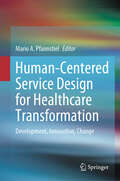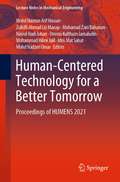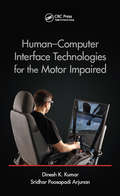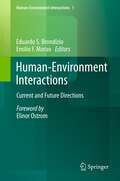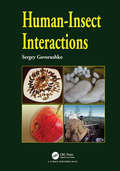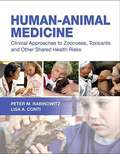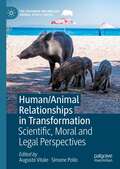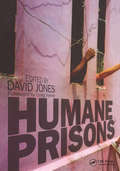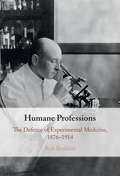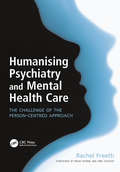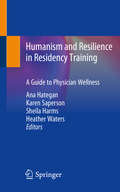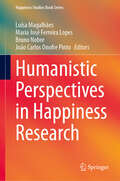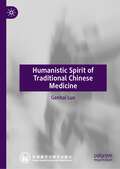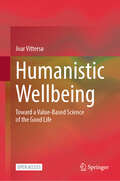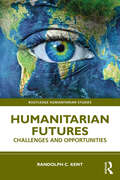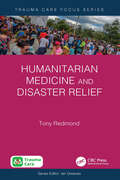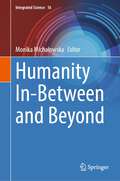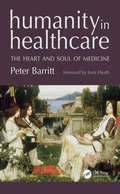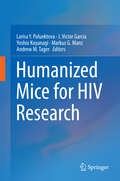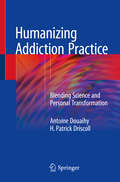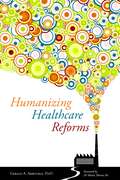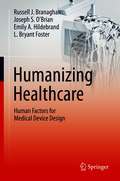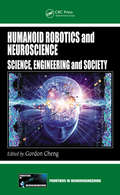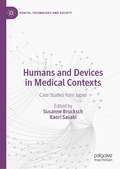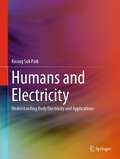- Table View
- List View
Human-Centered Service Design for Healthcare Transformation: Development, Innovation, Change
by Mario A. PfannstielThis book explores the use of human-centered service design. Through a variety of case studies and best practices, it highlights ways to systematically improve the provision of healthcare services to different target and age groups in order to understand customer expectations and needs. The book also offers new insights into the dyadic relationship between service provider and customer, each of which has their own set of goals, purposes, and benefits and must cope with a scarcity of resources and opportunities to optimize and design. Written by recognized experts, scholars, and practitioners, this book demonstrates how, where, and when to successfully apply human-centered service design at multiple levels, including corporate, departmental, and product/service. Value-added services are not only assessed in terms of their effectiveness, efficiency, and productivity, but also bearing in mind human emotions, interactions, and communication techniques as an important part of service provision. Accordingly, the book will appeal to scholars and practitioners in the hospital and healthcare sector, and to anyone interested in organizational development, service business model innovation, customer involvement and perceptions, and the service experience.
Human-Centered Technology for a Better Tomorrow: Proceedings of HUMENS 2021 (Lecture Notes in Mechanical Engineering)
by Mohd Hasnun Arif Hassan Zulkifli Ahmad A Manap Mohamad Zairi Baharom Nasrul Hadi Johari Ummu Kulthum Jamaludin Muhammad Hilmi Jalil Idris Mat Sahat Mohd Nadzeri OmarThis book acts as a compilation of papers presented in the Human Engineering Symposium (HUMENS 2021). The symposium theme, “Human-centered Technology for A Better Tomorrow,” covers the following research topics: ergonomics, biomechanics, sports technology, medical device and instrumentation, artificial intelligence / machine learning, industrial design, rehabilitation, additive manufacturing, modelling and bio-simulation, and signal processing. Fifty-nine articles published in this book are divided into four parts, namely Part 1—Artificial Intelligence and Biosimulation, Part 2—Biomechanics, Safety and Sports, Part 3—Design and Instrumentation, and Part 4—Ergonomics.
Human-Computer Interface Technologies for the Motor Impaired (Rehabilitation Science In Practice Ser.)
by Dinesh K. Kumar Sridhar Poosapadi ArjunanHuman Computer Interface Technologies for the Motor Impaired examines both the technical and social aspects of human computer interface (HCI). Written by world-class academic experts committed to improving HCI technologies for people with disabilities, this all-inclusive book explores the latest research, and offers insight into the current limitat
Human-Environment Interactions
by Emilio F. Moran Eduardo S. BrondízioDrawing on research from eleven countries across four continents, the 16 chapters in the volume bring perspectives from various specialties in anthropology and human ecology, institutional analysis, historical and political ecology, geography, archaeology, and land change sciences. The four sections of the volume reflect complementary approaches to HEI: health and adaptation approaches, land change and landscape management approaches, institutional and political-ecology approaches, and historical and archaeological approaches.
Human-Insect Interactions
by Sergey GovorushkoThis book presents a 360-degree picture of the world of insects and explores how their existence affects our lives: the "good, bad, and ugly" aspects of their interactions with humankind. It provides a lucid introductory text for beginning undergraduate students in the life sciences, particularly those pursuing beginner courses in entomology, agriculture, and botany.
Human-animal Medicine: Clinical Approaches To Zoonoses, Toxicants And Other Shared Health Risks
by Lisa Conti Peter RabinowitzHuman-Animal Medicine is an innovative reference exploring the unprecedented convergence of human, animal, and environmental health, triggering global pandemics and requiring new clinical paradigms. The "One Health" approach calls for greater communication and cooperation between human health care providers, public health professionals, and veterinarians to better address vital issues of emerging diseases and environmental change. This incredibly timely book provides, for the first time, practical guidelines for "One Health" collaborations in a wide range of clinical human-animal health issues, including the H1N1 virus, zoonotic diseases, the human-animal bond, animal allergy, bites and stings, and animals as "sentinels" for toxic environmental health hazards.
Human/Animal Relationships in Transformation: Scientific, Moral and Legal Perspectives (The Palgrave Macmillan Animal Ethics Series)
by Augusto Vitale Simone PolloThe ethics of human/animal relationships is a growing field of academic research and a topic for public discussion and regulatory interventions from law-makers, governments and private institutions. Human/animal relationships are in transformation and understanding the nature of this process is crucial for all those who believe that the enlargement of moral and legal recognition to nonhuman animals is part of contemporary moral and political progress. Understanding the nature of this process means analysing and critically discussing the philosophical, scientific and legal concepts and arguments embedded in it. This book contributes to the discussion by bringing together the ideas and reflections of leading experts from different disciplinary backgrounds and with a range of scientific perspectives.This book both provides an up-to-date examination of the transformation of human/animal relationships and presents ideas to foster this process.
Humane Prisons
by David JonesBased on the popular courses run by the Centre for Evidence-Based Medicine in Oxford, and written by leading figures working in the field of evidence-based medicine, this workbook provides papers appropriate for the study of child health.
Humane Professions: The Defence of Experimental Medicine, 1876–1914
by Rob BoddiceIn this compelling history of the co-ordinated, transnational defence of medical experimentation in the nineteenth and early twentieth centuries, Rob Boddice explores the experience of vivisection as humanitarian practice. He captures the rise of the professional and specialist medical scientist, whose métier was animal experimentation, and whose guiding principle was 'humanity' or the reduction of the aggregate of suffering in the world. He also highlights the rhetorical rehearsal of scientific practices as humane and humanitarian, and connects these often defensive professions to meaningful changes in the experience of doing science. Humane Professions examines the strategies employed by the medical establishment to try to cement an idea in the public consciousness: that the blood spilt in medical laboratories served a far-reaching human good.
Humanising Psychiatry and Mental Health Care: The Challenge of the Person-Centred Approach (Radcliffe Ser.)
by Rachel FreethThis book explores, in depth, the link between modern psychiatric practice and the person-centred approach. It promotes an open dialogue between traditional rivals – counsellors and psychiatrists within the NHS – to assist greater understanding and improve practice. Easy to read and comprehend, it explains complex issues in a clear and accessible manner. The author is a full-time psychiatrist and qualified counsellor who offers a unique perspective drawing on personal experience. Humanising Psychiatry and Mental Health Care will be of significant interest and help to all mental health professionals including psychiatrists and psychiatric nurses, social care workers, occupational therapists, psychologists, person-centred counsellors and therapists. Health and social care policy makers and shapers, including patient groups, will also find it helpful and informative.
Humanism and Resilience in Residency Training: A Guide to Physician Wellness
by Ana Hategan Karen Saperson Sheila Harms Heather WatersThis book aims to help identify pre-existing adaptive traits and positive perspectives in resident trainees, while challenging those that are less adaptive by building a formal curriculum for medical education that focuses on the humanistic aspects of medicine. Humanism in medicine is threatened by the false narrative that good physicians are superhumans who do not have their own needs. Written by experts in the field, this book is designed to be a concise, integrated guide to resilience during residency training. Through this guide, trainees learn (i) the usefulness of psychotherapeutic strategies for their own stress management and well-being; (ii) techniques and strategies that are useful in the practice of medicine; and (iii) to consider lifestyle modifications to improve physical and psychological health and well-being, through identification of positive and negative lifestyle factors influencing physicians’ response to stress.Since it is designed for busy trainees and physicians, this volume meticulously provides easy-to-use, evidence-based learning tools and therapeutic techniques, including case studies, skill-building exercises, self-test questionnaires, illustrations, useful practice-reminder tips, and other features.Humanism and Resilience in Residency Training is an excellent resource for all medical trainees and professionals who need to incorporate humanism and resilience in their practice, both for accreditation requirements and for personal well-being. This includes medical students and residents, psychiatrists, addiction medicine specialists, family physicians, medical education professionals, hospitalists, nurses, and all healthcare providers
Humanistic Perspectives in Happiness Research (Happiness Studies Book Series)
by Luísa Magalhães Maria José Ferreira Lopes Bruno Nobre João Carlos Onofre PintoThis volume provides innovative perspectives on the scholarly connection between the humanities and happiness, and considers the narrative expressions of happiness and recent investigations about happiness, its metrics, and objective insights about human wellbeing. This volume relates intemporal humanistic values to views across social and behavioural sciences, and thereby covers a broad interdisciplinary frame, from philosophy, psychology, literary studies, to the communication sciences. The philosophers in this volume discuss the achievement of happiness through the cultivation of virtue, as well as the logic of the gift as an experience of personal fulfilment and the fact that happiness is inextricably linked to hope. Their chapters take on the approach of the permanent human struggle to generate global horizons of happiness and thus attain eternal bliss. Scholars from other fields of the humanities and communication sciences consider the positive messages of environmental happiness in virtual platforms, where the Homo digitalis finds happiness at the click of a button, often under the endorsement of celebrities, or under the visual fruition of playful objects. They also present the intertextual memory of happiness as a condition for humanistic research. Finally, this volume considers the sphere of education as the best place in which to apply the results of sustainable happiness measurement and research, and to realize this complementary, humanistic perspective on happiness research.
Humanistic Spirit of Traditional Chinese Medicine
by Genhai LuoThis book aims to introduce in everyday language the profound culture and unique legacy of the ancient healing art with mesmerizing stories, allusions and anecdotes in the history of its evolution, handpicked from three perspectives, including contributions of master TCM practitioners, the nourishment of TCM by traditional Chinese culture, and the exchanges between TCM and its western counterparts. The vivid narrative of each section is complemented with elaboration of one related key TCM concept in a specific column. It is a brilliant reader for those interested in TCM and traditional Chinese culture.
Humanistic Wellbeing: Toward a Value-Based Science of the Good Life
by Joar VittersøThis open access book seeks to change the way we think about happiness and the good life. It starts ambitiously by exploring how the biological question, “What is life?” can be integrated with the philosophical question, “What is good?” It ends with a radical idea for how scientific reasoning can include a value-based theory of the good life. Anchored in basic knowledge about human nature, the new humanistic theory of wellbeing suggests that a life is good to the extent that it allows us to perform our humanness well. The theory further defines a well-performed humanness as the fulfilment of three universal human needs: the need for stability, the need for change, and the need to and for care. To reach this standpoint, the author critically examines major concepts in the wellbeing literature, such as values, happiness, life satisfaction, affect, hedonia, eudaimonia, and the good life. Based on these reviews, the author argues that a science of wellbeing cannot be strictly descriptive and value-free. A life should not be considered good only because it feels good or is thought of as good for the person living it. A good life must also be committed to a universal morality. Therefore, the humanistic theory of wellbeing suggests that it is good to like one’s life, but even better to like it for the right reasons.
Humanitarian Futures: Challenges and Opportunities (Routledge Humanitarian Studies)
by Randolph C. KentHumanitarian Futures: Challenges and Opportunities explores the increasing types, dimensions and dynamics of crises threatening the world in the twenty-first century, and argues that those with humanitarian roles and responsibilities can only meet such challenges if their approaches to strategic and operational planning undergo fundamental paradigmatic shifts. Strategically and operationally, such shifts must begin by planning from the future, for the future.Author Randolph C. Kent, the UN’s first Humanitarian Coordinator, with experience in some of the most complex crises of modern times, including Rwanda, Ethiopia, Kosovo, Sudan and Somalia, provides a blueprint for dealing with ever greater complexity on planet Earth and beyond. That blueprint is not about upgrading existing tools or relying upon tried precedence. Rather, it points to a new paradigm for meeting crises. It begins by looking at the changing nature of humanness and governance, and then turns to plausible future crises based on such changes, before concluding with practical steps for dealing with ever more complex humanitarian threats, now and in the future.This book will be an essential read for humanitarian policymakers and practitioners as well as for humanitarian and global studies researchers and students who are and want to be engaged in understanding and preparing for ever more complex and unpredictable humanitarian challenges.
Humanitarian Medicine and Disaster Relief (Trauma Care Focus)
by Tony RedmondFocusing on emergency medical humanitarian assistance, this accessible new text provides practical clinical guidance for those working in emergency medicine, critical care, and military medicine. There has been great progress over the last 30 years in establishing standards and training programmes to ensure that those who respond to major emergencies are appropriately trained, adequately equipped, qualified to do this work, and accountable for the work that they do. These developments together with insights into current requirements for healthcare and emergency responses are reflected in this book.
Humanity In-Between and Beyond (Integrated Science #16)
by Monika MichałowskaThis volume discusses the definitional problems and conceptual strategies involved in defining the human. By crossing the boundaries of disciplines and themes, it offers a transdisciplinary platform for exploring the new ideas of the human and adjusting to the dynamic in which we are plunged. The emerging cyborgs and transhumans call for an urgent reconsideration of humans as individuals and collectives. The identity of the human in the 21st century eludes definitions underpinned by simplifying and simplified dichotomies. Affecting all the spheres of life, the discoveries and achievements of recent decades have challenged the bipolar categorizations of human/nonhuman and human/machine, real/virtual and thus opened the door to transdisciplinary considerations. Ours is a new world where the boundaries of normality and abnormality, a legacy of the long history of philosophy, medicine, and science need dismantling. We are now on our way to re-examine, re-understand, and re-describe what normal-abnormal, human-nonhuman, and I-we-they mean. We find ourselves facing what resembles the liminal stage of a global ritual, a stage of being in-between—between the old anthropocentric order and a new position of blurred boundaries. The volume addresses philosophical, bioethical, sociological, and cognitive approaches developed to transcend the binaries of human-nonhuman, natural-artificial, individual-collective, and real-virtual.
Humanity in Healthcare: The Heart and Soul of Medicine
by Peter BarrittThe impressive progress of medical science over the nineteenth and twentieth centuries has tended to overshadow the art of caring for the patient and their families. This book aims to restore the balance by examining practical ways in which the arts can help health professionals to understand the experience of suffering and illness. Written by a family physician with 25 years experience, Humanity in Healthcare offers a broad perspective on the potential contribution of the arts toward fostering a humane approach to the care of those who are ill or suffering. It refers to a wide range of literature from prose and poetry, sociology, history, philosophy, politics, religion and spirituality. This book is an invaluable resource for all medical and healthcare professionals as well as students of the medical humanities.
Humanized Mice for HIV Research
by Larisa Y. Poluektova J. Victor Garcia Yoshio Koyanagi Markus G. Manz Andrew M. TagerOver the last several years the field of humanized mice has matured and developed into an essential component of translational research for HIV/AIDS. Humanized mice serve both as vehicles for discovery and as highly sophisticated platforms for biomedical research. In addition, humanized mice have demonstrated outstanding potential for the investigation of critical aspects of the infection and pathogenesis of the hepatitis and herpes viruses, as well as highly relevant microbial infections such as tuberculosis and malaria. Humanized Mice for HIV Research provides a comprehensive presentation of the history, evolution, applications, and current state of the art of this unique animal model. An expansion of twelve review articles that were published in Humanized Mice by Springer in 2008 (Eds: Nomura T, Watanabe T, Habu S), this book expertly captures the outstanding progress that has been made in the development, improvement, implementation, and validation of humanized mouse models. The first two parts of this book cover the basics of human-to-mouse xenotransplantation biology, and provide critical information about human immune cell development and function based on individual models created from different immunodeficient strains of mice. The third and fourth parts investigate HIV-1 biology, including different routes of transmission, prevention, treatment, pathogenesis, and the development of adaptive immunity in humanized mice. The fifth part shows the broad applicability of humanized mice for therapeutic development, from long-acting antiretroviral combinations to genetic manipulations with human cells and cell-based approaches. The sixth part includes liver tissue engineering and the expansion of humanized mice for many other human cell-tropic pathogens.
Humanizing Addiction Practice: Blending Science and Personal Transformation
by Antoine Douaihy H. Patrick DriscollThis original, eloquent, compassionate, and timely book offers all healthcare practitioners interested and involved in addiction practice a powerful account of an addiction psychiatrist’s journey of professional and personal growth, thereby offering readers a unique opportunity to learn deeply from the author’s insights, experiences, and struggles in becoming a patient-centered empathic healer. Through sharing and exploring clinical experiences in addiction practice, this fascinating title delves into the lead author and his mentee’s personal, professional, and ethical challenges and weaves together science and humanism, offering a wealth of experiential wisdom and tools that have the power to transform our understanding of therapeutic work with people with addictions. Written with empathy and humility, Humanizing Addiction: Blending Science and Personal Transformation provides a compelling argument and framework for integrating humanism with empirically grounded practices. This important book is an invaluable resource for healers from a range of backgrounds: physicians, physician assistants, nurse practitioners, social workers, case managers, patient navigators, clinical and health psychologists, pharmacists, counselors, graduate students, and medical trainees involved in clinical care of people with addiction and substance use problems.
Humanizing Healthcare Reforms
by Maria Theresa Ho Gerald ArbuckleLooking at the current turmoil facing contemporary healthcare systems worldwide, resulting from relentless imposition of financially-based performance indicators, the author argues that a return to a values-based approach to healthcare will create positive transformation. Writing from the fresh perspective of social anthropology, the author takes a highly pragmatic approach to practice, emphasizing the importance of values such as compassion, solidarity and social justice. He suggests that without being able clearly to identify the values and goals that unite their members, healthcare organizations are unlikely to be able to meet the demands of the constant and varied pressures they face, and explains how individuals at every level in healthcare can contribute in practical ways to positive change within their organizations. This much-needed and very accessible book will be essential reading for anyone interested in a better approach to healthcare reform, from clinicians and nurses, to managers and policy makers, as well as the interested reader.
Humanizing Healthcare – Human Factors for Medical Device Design
by Russell J. Branaghan Joseph S. O’Brian Emily A. Hildebrand L. Bryant FosterThis book introduces human factors engineering (HFE) principles, guidelines, and design methods for medical device design. It starts with an overview of physical, perceptual, and cognitive abilities and limitations, and their implications for design. This analysis produces a set of human factors principles that can be applied across many design challenges, which are then applied to guidelines for designing input controls, visual displays, auditory displays (alerts, alarms, warnings), and human-computer interaction. Specific challenges and solutions for various medical device domains, such as robotic surgery, laparoscopic surgery, artificial organs, wearables, continuous glucose monitors and insulin pumps, and reprocessing, are discussed. Human factors research and design methods are provided and integrated into a human factors design lifecycle, and a discussion of regulatory requirements and procedures is provided, including guidance on what human factors activities should be conducted when and how they should be documented.This hands-on professional reference is an essential introduction and resource for students and practitioners in HFE, biomedical engineering, industrial design, graphic design, user-experience design, quality engineering, product management, and regulatory affairs.Teaches readers to design medical devices that are safer, more effective, and less error prone;Explains the role and responsibilities of regulatory agencies in medical device design;Introduces analysis and research methods such as UFMEA, task analysis, heuristic evaluation, and usability testing.
Humanoid Robotics and Neuroscience: Science, Engineering and Society
by Gordon ChengHumanoid robots are highly sophisticated machines equipped with human-like sensory and motor capabilities. Today we are on the verge of a new era of rapid transformations in both science and engineering-one that brings together technological advancements in a way that will accelerate both neuroscience and robotics. Humanoid Robotics and Neuroscienc
Humans and Devices in Medical Contexts: Case Studies from Japan (Health, Technology and Society)
by Susanne Brucksch Kaori SasakiThis book explores the ways in which socio-technical settings in medical contexts find varying articulations in a specific locale. Focusing on Japan, it consists of nine case studies on topics concerning: experiences with radiation in Hiroshima, Nagasaki, and Fukushima; patient security, end-of-life and high-tech medicine in hospitals; innovation and diffusion of medical technology; and the engineering and evaluating of novel devices in clinical trials. The individual chapters situate humans and devices in medical settings in their given semantic, pragmatic, institutional and historical context. A highly interdisciplinary approach offers deep insights beyond the manifold findings of each case study, thereby enriching academic discussions on socio-technical settings in medical contexts amongst affiliated disciplines. This volume will be of broad interest to scholars, practitioners, policy makers and students from various disciplines, including Science and Technology Studies (STS), medical humanities, social sciences, ethics and law, business and innovation studies, as well as biomedical engineering, medicine and public health.
Humans and Electricity: Understanding Body Electricity and Applications
by Kwang Suk ParkHumans are electric beings. We are managed, monitored, and stimulated electrically. This textbook provides students and practitioners with a solid foundation and understanding of human electricity and the work currently being done to further develop electrical signals for medical purposes and related goals. The book introduces the fundamentals of how biological systems generate electrical signals, covering a wide range of biomedical engineering topics including bioelectricity, biomedical signals, neural engineering, and brain-computer interface. The book is presented in three sections: Part I explains how electrical signals and impulses manage the human body; Part II examines the kinds of electrical signals from the human body and how they are monitored, controlled, and used; Part III looks at clinical use of electrical stimulation toward the human body and how they are being developed for interventions in medicine. The book is also a valuable professional reference for practicing engineers and scientists. Explains humans as electric beings who are managed, monitored, and stimulated electrically;Deals with the electricity of major human organs;Covers a wide range of biomedical engineering topics
